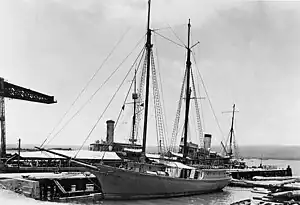37°46′11″N 122°14′03″W / 37.769854°N 122.23415°W
.jpg.webp)



.jpg.webp)
W. F. Stone & Son or Stone Boat Yard was a small wooden shipbuilding company in Alameda, California. To support the World War 2 demand for ships W. F. Stone & Son built tugboats, sub chasers and minesweepers. For World War 1 the shipyard, then called W. F. Stone & Son at Kennedy and Bocimer Streets, built tugboats for postwar work in 1921. The shipyard was opened in 1853 by William F. Stone (W. F. Stone), from Dartmouth, England, at the Hunter's Point in San Francisco Bay, near the current Hunters Point Naval Shipyard. In 1892 William Stone's son, Frank, ran the company and moved the shipyard to Tiburon. In 1899 he moved the shipyard again to Harbor View, San Francisco. In 1911, he again moved to Diesel Way, in Oakland, near Union Point Park on the Tidal Canal. When Lester Stone, Frank's son, became a partner, the company was changed to W. F. Stone & Son. In 1923, Frank Stone died, Lester Stone continued the company. In 1942 the company moved again, to 2517 Blanding Ave, Alameda on the south side of the Tidal Canal. In 1970 Lester Stone retired and sold the shipyard to John Whitset. Whitset, who did not rename the company, the company went into bankruptcy in 1986. It came out of bankruptcy and was sold to Bill and Grace Bodle. Bodle sold the company in 2000 to David Olson. The shipyard closed in 2004. For most of its history, the shipyard built a large variety of schooners, fishing boats, cargo ships, tugboats, sailboats, racing and recreational yachts.[1][2]
Notable ships
Notable ships include:
- USS Lanikai was a 1914 209-ton, 95-foot (29 m), schooner-rigged, diesel-powered yacht used by the US Navy for World War I and World War II, she was then transferred to the Royal Australian Navy. She sank in Subic Bay in 1947 during a typhoon.[3]
- The schooner Golden State built in 1913 at 354 tons, was 140 feet (43 m) long, and was used in 1930s and 1940s movies in Long Beach, California. Sold to Costa Rica in 1943.[4]
- Northern Light a 247-ton, 140-foot yacht built for John Borden, a Chicago banker. On April 21, 1927, Borden, his wife and crew took the Northern Light on an expedition to the Arctic on behalf of the Field Museum of Chicago. Borden's wife wrote a book about the Arctic expedition, The Cruise of the Northern Light. released in December 1928.[5][6][7][8]
World War 2
World War 2 ships built for the US Navy:
| Name | Type | Tons | Delivered | Notes |
|---|---|---|---|---|
| YMS-299 | Minesweeper | 278 | 7 April 1943 | Reclassified in 1947 as Rhea (AMS 52). Sold in 1960 as training ship in Port Stanley Ontario, scrapped in 1997. Was part of the Battle of Okinawa. |
| YMS 300 | Minesweeper | 278 | 3 July 1943 | US Navy struck in 1946 |
| YMS 301 | Minesweeper | 278 | 11 September 1943 | To the USSR 1945 as T-605, scrapped in 1956 |
| YMS 302 | Minesweeper | 278 | 5 November 1943 | US Navy struck in 1948 |
| PCS 1421 | Sub chaser | 278 | 19 February 1944 | Sold in 1947 |
| PCS 1422 | Sub chaser | 278 | 24 April 1944 | Sold in 1947 |
| YT 254 | Tug | 260 | 24 August 1944 | Renamed to Menatonon, struck 1960 |
| YT 255 | Tug | 260 | 30 September 1944 | Renamed to Kennesaw, struck 1960 |
- YMS-299, YMS-300 and YMS-301 were YMS-1-class minesweeper of the YMS-135 subclasss built for the US Navy to remove naval mines that had been placed in the water to prevent ships from passing. They were armed with one 40 mm gun mount, two 20 mm guns, machine guns, and two depth charge racks.[9]
- PCS 1421 and PCS 1422 were 245 tons light and 338 tons full, had a length of 136 feet (41 m), a beam of 24 feet (7.3 m), a draft of 8 feet (2.4 m), a top speed of 14.1 knots (26.1 km/h; 16.2 mph) and a crew of 57. They were armed with one 3"/50 caliber gun, one 20 mm anti-air (AA) gun, four depth charge projectors, one depth charge Hedgehog projector, and two depth charge tracks. Power was from two 800-brake-horsepower (600 kW) General Motors 8-268A diesel engines to a Snow and Knobstedt single reduction gear to two shafts.[10]
- YT 254 and YT 255 were District Harbor Tug, Large. The tugs were 410 tons, with a length of 110 feet (34 m), a beam of 27 feet (8.2 m), a draft of 11 feet (3.4 m), a top speed 12 knots (22 km/h; 14 mph) and a crew of 12. They were armed with two .50 cal. machine guns. Power was one diesel engine and a single propeller creating 1,000 shaft horsepower (750 kW).[11]
See also
References
- ↑ shipbuildinghistory.com W. F. Stone & Son
- ↑ Archives Spotlight: Definitive Men of the San Francisco Bay, M. Crawford, May 28, 2013
- ↑ "A guide to the Golden State (built 1913; schooner, 3m) records, 18 May 1936- 22 August 1936". Online Archive of California.
- ↑ "Boat Launched At Oakland For Northern Expedition". The Sacramento Bee. Sacramento, California. 17 Jan 1927. p. 11. Retrieved 2020-12-18 – via Newspapers.com.
- ↑ "Arctic, "Cruise of the Northern Light" Is Record of the Borden Trip Which Started from Oakland; "ice-Bound" Tale of the North". Oakland Tribune. Oakland, California. 9 Dec 1928. p. 49. Retrieved 2020-12-18 – via Newspapers.com.
- ↑ Borden, Courtney (1928). The cruise of the Northern Light. publisher not identified. OCLC 651912092.
- ↑ Borden, Mrs. John (2004). The Cruise of the Northern Light. Mechanicsburg, Pennsylvania: Stackpole Books. ISBN 9780811731409.
- ↑ navsource, YMS-299 Rhea
- ↑ navsource.org PCS 1421
- ↑ navsource, YT 254